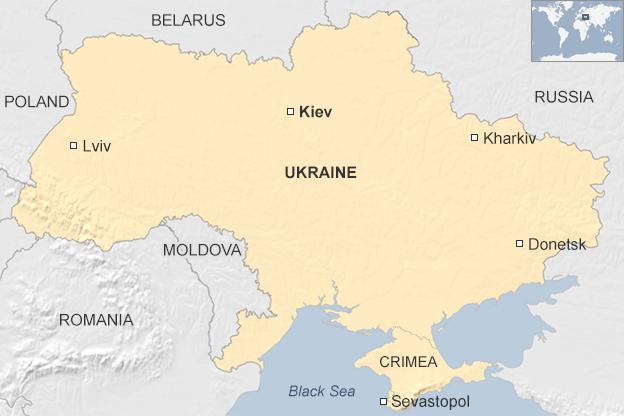Ukraine Crimea: Rival rallies confront one another
- Published
Mark Lowen and Daniel Sandford report from the police cordon separating rival rallies in Simferopol
Pro-Kiev and pro-Moscow protesters have scuffled in Ukraine's Crimea region, as tensions increase following last week's ousting of President Viktor Yanukovych.
One person died, probably from a heart attack, during the confrontation outside parliament in Simferopol.
Only a police cordon separated the rallies - one pro-Russian, the other involving Crimean Tatars and people backing Ukraine's change of government.
Meanwhile, Mr Yanukovych has been put on the international wanted list.
The fugitive president is accused of being behind the deaths of more than 100 protesters at the hands of riot police.
But despite rumours that Mr Yanukovych - who fled Kiev at the weekend - is now in Russia, deputy general prosecutor Mykhailo Holomsha told reporters: "We have information indicating Yanukovych is still in Ukraine."
A new cabinet is due to be unveiled in the capital Kiev later on Wednesday.
It is widely believed that a number of activists from Kiev's main protest camp, the Maidan, will be offered ministerial roles.
Any new cabinet will face a daunting set of challenges, with many areas of government in Ukraine needing urgent reform, the BBC's David Stern in Kiev reports.
In a separate development, the interim authorities have disbanded the elite Berkut police units, which are blamed for the deaths of dozens of protesters in the Ukrainian capital last week.
'Provocation'
Thousands of people took part in the two rival rallies in Crimea's administrative capital ahead of a planned session of the region's parliament, where the issue of Crimea's status had been initially expected to be raised.
However, Crimean parliamentary speaker Volodymyr Konstantinov later said MPs would not discuss any secession by Crimea, which currently enjoys autonomy within Ukraine.
Mr Konstantinov described as "provocation" earlier media reports on the issue.
In Simferopol, Crimean Tatars chanted "Glory to Ukraine!", while the pro-Russian activists responded with "Russia!"
A body of an elderly man was found during the rallies, Crimea's health ministry said in a statement., external
It said the unidentified man had no signs of injuries, and had probably died from a heart attack.
After the rallies, Crimean Tatar leader Refat Chubarov called on activists - including ethnic Russians - to form self-defence units to prevent any violence or provocations, Ukrainska Pravda news website reports.
Crimea - where ethnic Russians are in a majority - was transferred from Russia to Ukraine in 1954.
Ethnic Ukrainians loyal to Kiev and Muslim Tatars - whose animus towards Russia stretches back to Stalin's deportations during World War II - have formed an alliance to oppose any move back towards Moscow.
The change of government in Kiev has raised questions over the future of Russia's naval bases in the Crimean port city of Sevastopol, the lease for which was extended until 2042 by Mr Yanukovych.
Most experts believe the new leadership will not push for the withdrawal of the Russian fleet, as this could further threaten Ukraine's internal stability as well as the country's fragile relations with Russia, the BBC's Ilya Abishev reports.
A statement issued by three former Ukrainian presidents on Wednesday - Leonid Kravchuk, Leonid Kuchma and Viktor Yushchenko - condemned what it said was Russian interference in Crimean politics.
'Serious threat'
Also on Wednesday, Russian President Vladimir Putin ordered a snap drill to test the combat readiness of troops in central and western Russia, near the border with Ukraine.
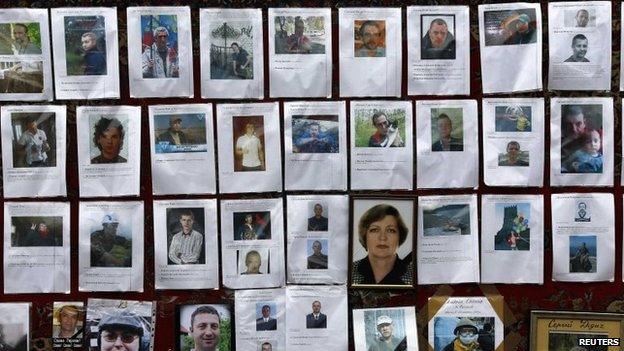
Images of some those killed in recent violence can be seen in a memorial in Kiev's Independence Square
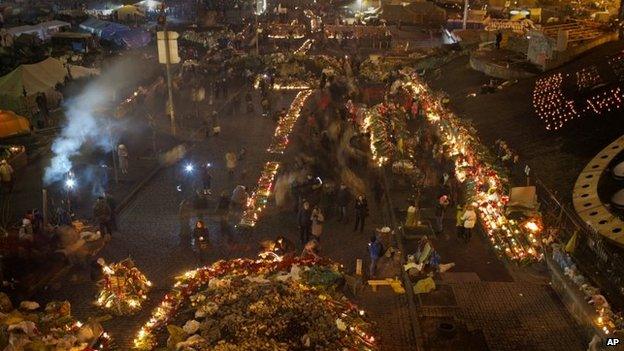
The square has become a shrine to the dead
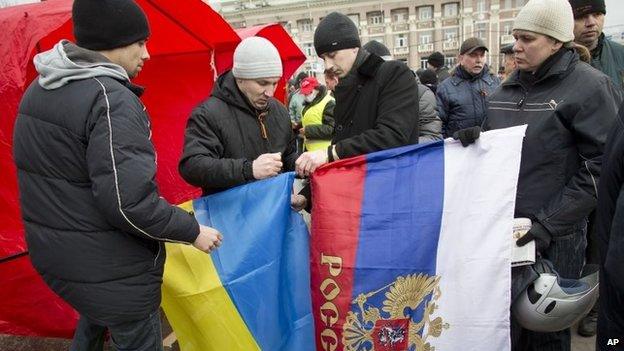
However, many who favour closer ties with Russia have been unhappy at the turn of events in Kiev
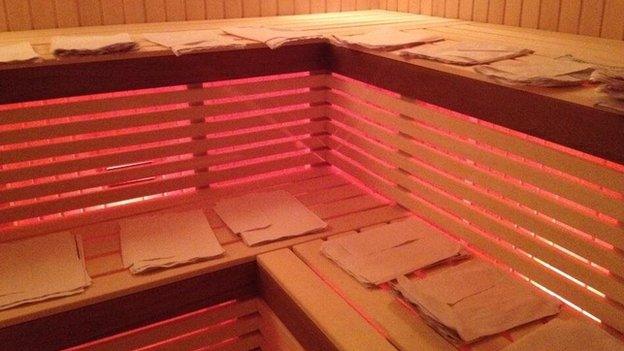
The BBC's Steve Rosenberg tweeted this picture of documents fished out of a lake at Mr Yanukovych's residence, now being dried out in a sauna at the property
Such checks are not uncommon, although the timing is seen as significant, correspondents say.
Russia, along with the US, UK and France, pledged to uphold the territorial integrity of Ukraine in a memorandum signed in 1994.
Russia has portrayed the ousting of Mr Yanukovych as a violent seizure of power by the opposition, while EU countries have largely backed the change in government.
In Kiev, acting Interior Minister Arsen Avakov announced that the Berkut police units had been disbanded.
He said all police officers would be investigated and those responsible for the deaths of anti-government protesters "would be punished".
The Berkut units reportedly had 4,000-5,000 members stationed across Ukraine.
The much-despised Berkut are just one part of the security and law enforcement agencies, which have long been accused by human rights groups and local citizens of human rights abuses.
Also on Wednesday, Ukraine's interim President Oleksandr Turchynov announced that he had assumed the duties of the head of the armed forces.
